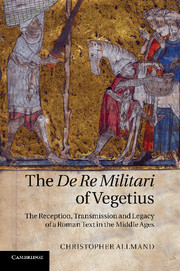 The De Re Militari of Vegetius
The De Re Militari of Vegetius Book contents
- Frontmatter
- Contents
- Figures
- Preface
- Abbreviations
- Introduction
- Part I The medieval reception
- 1 General remarks on the manuscripts
- 2 Analysis of the manuscripts
- 3 A particular response to the De re militari…and its influence
- 4 Bedfellows
- 5 Owners and their texts
- Part II The transmission
- Part III The legacy: the De re militari in medieval military thought and practice
- Appendix I Table of select terms used in translations of the De re militari
- Appendix II List of manuscripts of the De re militari
- Bibliography
- Index
- References
1 - General remarks on the manuscripts
from Part I - The medieval reception
Published online by Cambridge University Press: 07 October 2011
- Frontmatter
- Contents
- Figures
- Preface
- Abbreviations
- Introduction
- Part I The medieval reception
- 1 General remarks on the manuscripts
- 2 Analysis of the manuscripts
- 3 A particular response to the De re militari…and its influence
- 4 Bedfellows
- 5 Owners and their texts
- Part II The transmission
- Part III The legacy: the De re militari in medieval military thought and practice
- Appendix I Table of select terms used in translations of the De re militari
- Appendix II List of manuscripts of the De re militari
- Bibliography
- Index
- References
Summary
How should we describe the process of the medieval reception of the De re militari from the manuscripts which have survived into our own time? How was the text read and understood? A manuscript, of course, will not talk about its life, about those who have owned, read or merely handled it. Yet, if examined closely, its folios can reveal a good deal about the use to which it has been put, whether it has been much read or has simply taken up space on a shelf, not to speak of its contents which have been either appreciated or criticised by past readers.
Of the 200 or more Latin manuscripts examined, about a third show little or no evidence of having prompted their readers to leave evidence of their labours; sometimes the folios remain uncannily clean. Are we then to conclude that these texts will have played little part in the transmission of Vegetius’ ideas? Others bear the marks of having been read, sometimes closely, and of having encouraged readers to respond by marking the folios in different ways. It is these manuscripts, the remaining two-thirds of the total, which provide us with the material upon which to form judgements regarding the interest provoked by the De re militari in the Middle Ages.
- Type
- Chapter
- Information
- The De Re Militari of VegetiusThe Reception, Transmission and Legacy of a Roman Text in the Middle Ages, pp. 13 - 16Publisher: Cambridge University PressPrint publication year: 2011


